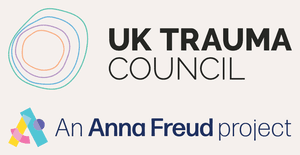Using the powerful medium of animation storytelling, this film was created to help inform and help young people cope with common physical and emotional responses to trauma, caused by experiences of war and conflict.
The animation was made in collaboration withThe UK Trauma Council (a project of mental health charity, Anna Freud), Childhood Trauma, Fred & Eric (a creative design and animation agency), and a group of young people with lived experience from the Kent Refugee Action Network (KRAN).
The UKTC gained funding for this project after highlighting the severe lack of resources available specifically for young people, on how to cope with negative feelings created through their lived experiences of war and conflict. They wanted to commission this animation (alongside additional online resources put together by UKTC) to help.
From start to finish, producing this animation was a highly collaborative experience. The animation team at Fred & Eric worked hand-in-hand with the leading researchers and clinical experts at the UK Trauma Council (UKTC), and the hugely articulate and inspirational group of young people from the Kent Refugee Action Network (KRAN). This group had lived experiences of war and conflict, and provided crucial guidance on how to make the animation useful and relevant to the diverse range of young people it was trying to reach.
The animation uses shattered reflections as a metaphor to visually symbolise the way trauma can infiltrate young people's lives, physically and mentally. Using this reflective device, the animation presents real-life characters whose worlds literally break apart in triggering situations. In turn, as coping strategies are introduced within the narration, these fragments begin to reform and heal. Illustrating the critical messaging; that although traumatic memories may always be part of these young people’s lives, it they don't have to define them now, or in their future.
To tell this story, it was important we represented real human characters and a range of locations, to evoke an emotional connection with the subject matter. Through a series of collaborative workshops, a fictional group of young people were cast to appear in the animation, who would tell their stories through first-person narration.
Insights on the effects of trauma from the experts at UKTC helped to create narratives for each character. This was especially important as in some languages there is no word for "trauma" or "PTSD". So giving young people the tools to recognise the cause and effect of their symptoms, was an important part of the process.
The animation has been shared through an extensive network of social media and networks. The channels chosen were based on research by UKTC and within our workshops with young people, for the best ways to reach a worldwide audience with access to varying levels of technology.
To help with this global distribution, the animation and accompanying resources have been translated into Arabic, Farsi, Hebrew, Pashto, Tigrinya and Ukrainian.
We are so proud this animation has been accepted into the Smiley Awards. We hope this boosts the project's aim, to help young people affected by war and conflict, see a brighter future beyond their past experiences.
Established in 2019, the UK Trauma Council (UKTC) is an independent, multidisciplinary group, able to speak with authority and experience on the impact of traumatic events on children and how best to help them. The Council is made up of experts on childhood trauma from the fields of neuroscience, psychology, psychiatry, global health and lived experience. We have recently established a Youth Advisory Board who will inform and shape the future focus and priorities of the UKTC.
The vision of the UKTC is a world which nurtures and protects children and young people following trauma and builds understanding of how to reduce the impact of traumatic events. Trauma is defined by UKTC as ‘the way that some distressing events are so extreme or intense that they overwhelm a person’s ability to cope, resulting in lasting negative impact.’
A primary focus for the UKTC has been developing and disseminating free, accessible, evidence-based resources to support the professionals surrounding children and/or young person following potentially traumatic experiences. By increasing the knowledge, skills and confidence of professionals in recognising and supporting trauma in children and young people, the UKTC aims to create an environment more conducive to recovery.

We align with the following UN Sustainable Development Goals: